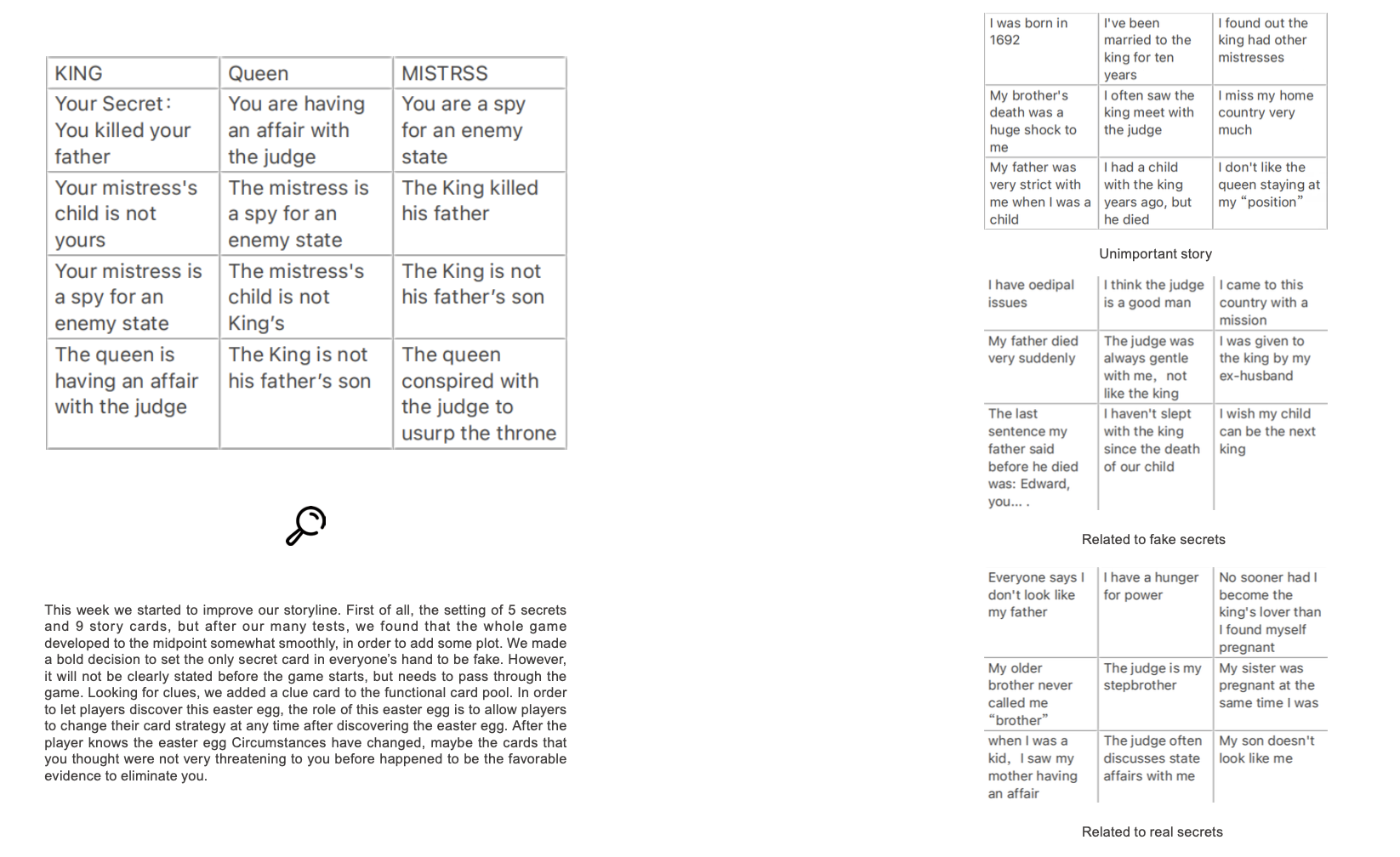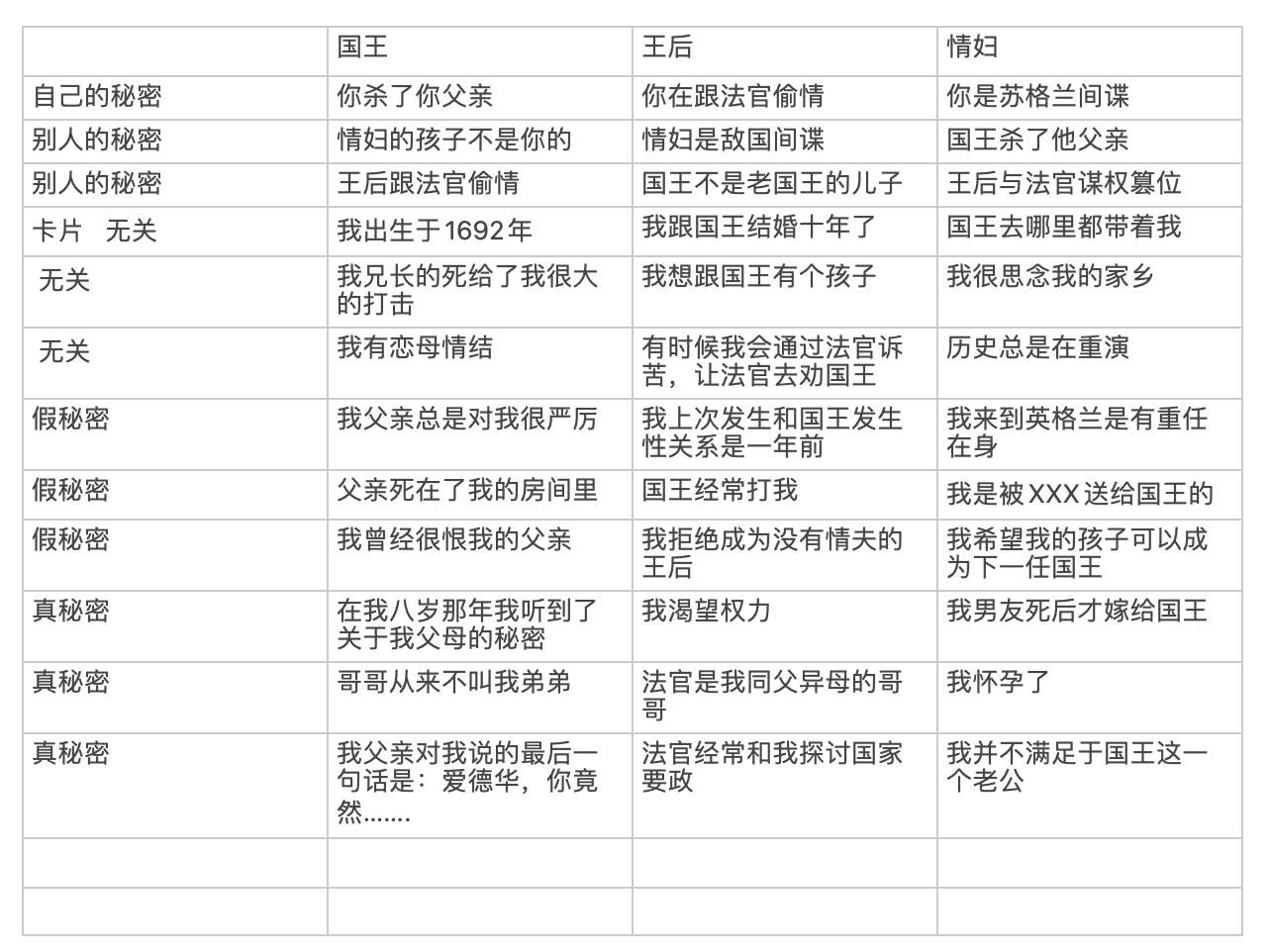Project Iteration:
Final plan of the storyline and cards

Original type in Chinese:

The game process:
1. Four players sit on a table (with QR codes or cards on the table), players can see the story ahead, then the king, queen, mistress and judge each have a card with QR codes on the card telling their own secrets and missions.
2. The king, queen and mistress are given two cards, one for the real secret and one for the fake secret, which are buttoned on the table with different patterns and logos on the back, symbolizing different character cards.
3. Next, each person is given nine cards to tell their story. Each person is required to play a card in each round under the auspices of the judge.
4. At the end of each card play, it is time to draw functional cards, and they can know the truth according to this part
Functional cards
Powerful cards*3
The player can choose one from any type of functional cards they want.
Report cards* 6
The player got one chance to blow the whistle
Random cards*6
Draw a card from someone else’s story card randomly
Search cards* 6
The clues by search card below:
1:Have you ever questioned if your own secrets are real after your amnesia
2. Escherian Stairwell may give you some hints
3.YES. Your secret is a fake one
4.Of the nine cards in your hand, only three are related to your real secret, three are related to your fake secret, and three have nothing to do with either
5: Your real secret is in someone else's hands
6: Now that you know everything, how can you protect yourself it at this point?
Direct clue cards* 6
1:The most dangerous words is the safest words
2:Observe your opponent's expressions and strategy changes
3:Don't be in a hurry to blow the whistle
4:The queen wants to be a more powerful person than the king
5:The king doubted his origins from an early age
6:The mistress are actually infertile
Winning the game relies heavily on finding clues from the story, searching for clue cards and direct clue cards.
Reading
Rules of play Chapter 18: Games as Cybernetic Systems
positive and negative system
As a game design schema, Games as Cybernetic Systems is one of the most practically applicable frameworks presented in this book. Cybernetic feedback systems can be wonderful ways of balancing your game to arrive at a particular result. What is wrong with your game: Is it ending too soon? Running on for too long? Is it too uncertain? Not uncertain enough? Is it too easy or too difficult for players to gain an advantage? You can address all these fundamental questions by looking for feedback loops existing within the formal structure of your game's design, or by adding additional loops of your own. Marc LeBlanc boiled down the relationship between game design and feedback systems to a set of design "rules." These rules offer a useful set of guidelines for integrating feedback systems into your design. Negative feedback stabilizes the game.Positive feedback destabilizes the game.
Loops and Arcs - Lost Garden
The ‘game’ aspect of this beast we call a computer game always involves ‘loops’.
- The player starts with a mental model that prompts them to…
- Apply an action to…
- The game system and in return…
- Receives feedback that…
- Updates their mental model and starts the loop all over again. Or kicks off a new loop.
Loops are a great way to build intelligence that helps the player understand the topic of a complex system. Just as our game requires rounds of card play/draw, players can gradually develop a mental model of success, failure, and other nuances that will allow them to handle new situations with confidence.
For action arcs, players still start with a mental model where they apply an action to the system and receive feedback. This interactive arc could be reading a book or watching a movie. However, newer mental models rarely cause players to return to the same interactions. The movie was seen. The books are consumed. An arc is a broken loop that you exit immediately.
Over the past 40-years, the dominant way you made money off media was to sell the customer an arc, be it a book, an album or a movie. Once they had consumed that, you sold them another one. With a large enough portfolio of games (typically managed by a publisher), you’d get a reliable stream of revenue.But these days, games that work like arcs for a long time seem to be more popular. There are huge financial benefits to being emotionally and financially involved over a long period of time. A good game is one that you can keep playing while paying for your hobby.
And most of all, evolution.